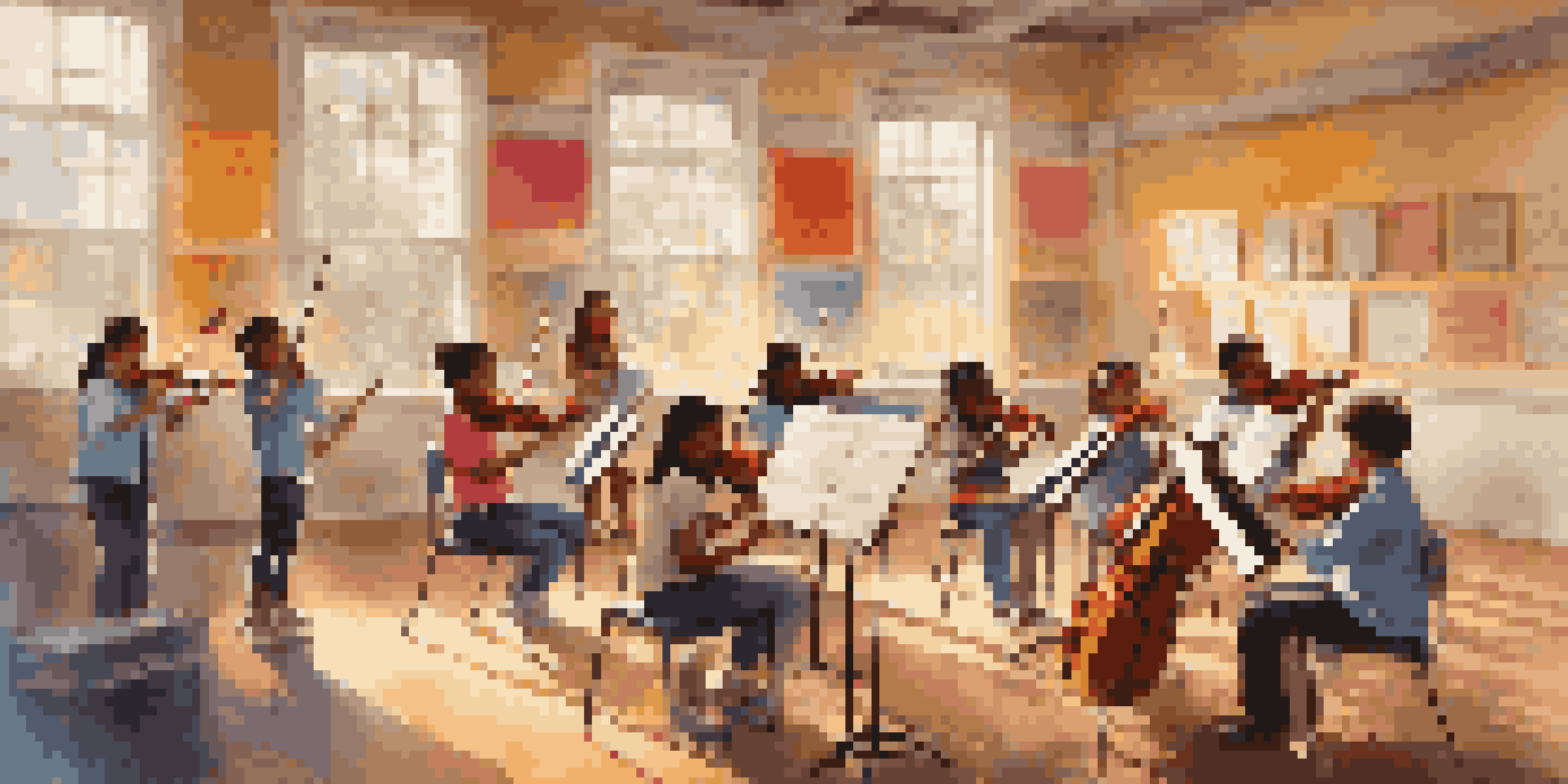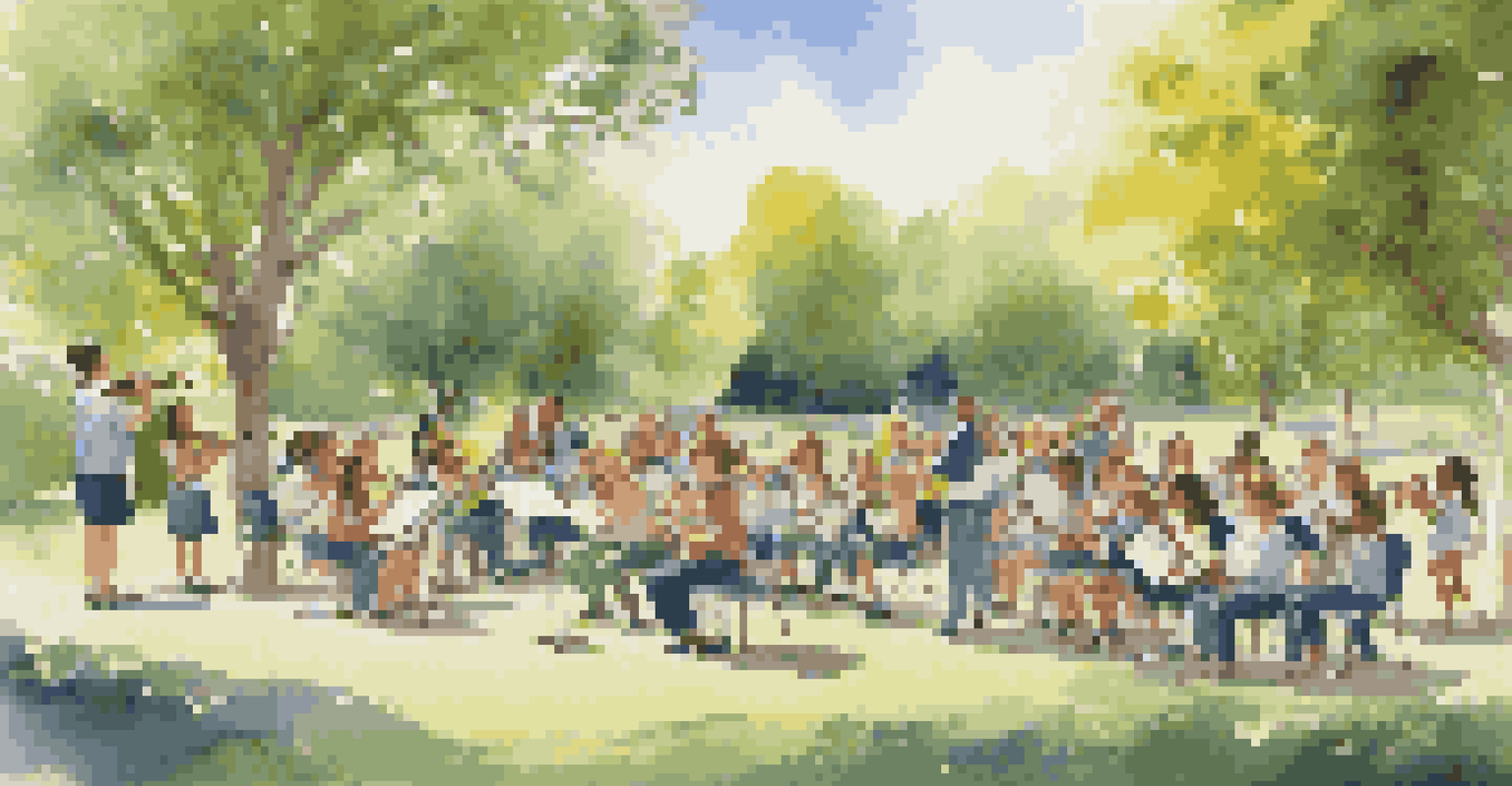The Effects of School Policies on Music Class Enrollment Rates

Understanding School Policies and Their Reach
School policies are guidelines set by educational institutions to govern student behavior and academic programs. They can impact various aspects of school life, including enrollment in elective courses like music. When schools implement policies that prioritize core subjects, music classes may suffer as a result.
Music can change the world because it can change people.
For instance, if a school enforces a strict focus on STEM (Science, Technology, Engineering, and Mathematics), students might feel pressured to allocate their time to these subjects over the arts. This can lead to a decline in music class enrollment, as students may perceive music as less critical to their future careers.
Additionally, policies that limit the number of electives or require students to choose between subjects can create barriers to music education. As a result, understanding the nuances of school policies is essential for recognizing their broader impact on music class participation.
The Role of Funding in Music Education
Funding is a crucial element that can shape school policies, especially concerning music education. Schools with limited budgets may have to make tough decisions about which programs to maintain. As a result, music classes can be at risk of cuts, leading to lower enrollment rates.

Moreover, when schools prioritize funding for sports or academic programs, music departments often face financial challenges. This can result in fewer musical instruments, less qualified instructors, or limited class offerings, all of which can deter students from enrolling in music classes.
In contrast, schools that actively allocate funds to support music programs often see higher enrollment numbers. This illustrates the direct correlation between funding levels and the availability of quality music education.
Impact of Standardized Testing on Music Classes
Standardized testing has become a cornerstone of education policy, often dictating the curriculum in many schools. As schools focus on improving test scores in core subjects, music education can take a back seat. This shift can diminish students' opportunities to engage in music classes.
The arts are an essential part of education just like reading, writing, and arithmetic. Music is the language of the spirit. It opens the secret of life bringing peace, abolishing strife.
When schools emphasize test preparation, music programs may be reduced or eliminated altogether, leaving students with fewer options. Consequently, students may feel that participating in music is less valued, leading to a decline in enrollment.
However, research shows that music education can enhance cognitive abilities and improve academic performance, suggesting that incorporating music into the curriculum could benefit test scores. This highlights the importance of balancing academic priorities with the arts.
Cultural Attitudes Towards Music Education
Cultural attitudes play a significant role in how music education is perceived within schools. In some communities, there may be a strong emphasis on academic achievement, leading to less importance placed on music classes. This can result in lower enrollment rates as students may feel the pressure to choose more traditionally valued subjects.
Conversely, in communities that celebrate arts and music, schools may witness higher participation in these classes. When music is integrated into the cultural fabric of a community, students are more likely to see its value, influencing their decision to enroll.
Schools that recognize and promote the cultural significance of music education can create an environment that encourages enrollment. By fostering a positive attitude toward music, schools can enhance students' engagement in these programs.
The Effect of Teacher Support on Music Enrollment
Teachers are pivotal in shaping students' interest in music classes. Supportive and passionate music educators can inspire students to enroll and participate actively. When teachers foster a welcoming environment, students are more likely to feel encouraged to explore their musical talents.
On the other hand, if music educators are overburdened or lack resources, their ability to engage students may diminish. This can lead to a less vibrant music program, which can negatively impact enrollment rates. Students often seek out classes where they feel inspired and supported.
Additionally, professional development for music teachers is essential. When teachers receive ongoing training and resources, they can enhance their teaching methods, making music classes more appealing to students.
Extracurricular Activities and Their Influence
Extracurricular activities, such as school bands and choirs, can significantly influence music class enrollment. When students participate in these activities, they often develop a greater appreciation for music, making them more likely to enroll in related classes. This connection shows how extracurricular programs can serve as a gateway to formal music education.
However, if schools do not offer sufficient extracurricular options, students may miss out on opportunities to engage with music outside the classroom. Without these experiences, students might view music as a less viable option when choosing their courses.
Therefore, schools that actively promote and support extracurricular music activities can boost overall interest and enrollment in music classes, illustrating the importance of a holistic approach to music education.
Parent Involvement and Its Importance
Parental support can significantly influence a student's decision to enroll in music classes. When parents prioritize and value music education, students are more likely to follow suit. This can create a culture of appreciation for the arts within families, making music class enrollment more likely.
Conversely, if parents are indifferent or skeptical about the benefits of music education, students may feel discouraged from pursuing it. This lack of support can lead to decreased enrollment rates as students seek validation from their family regarding their educational choices.

Schools can enhance enrollment by engaging parents in music programs through concerts, workshops, and information sessions. By fostering a partnership with families, schools can create a supportive environment that encourages students to explore their musical interests.